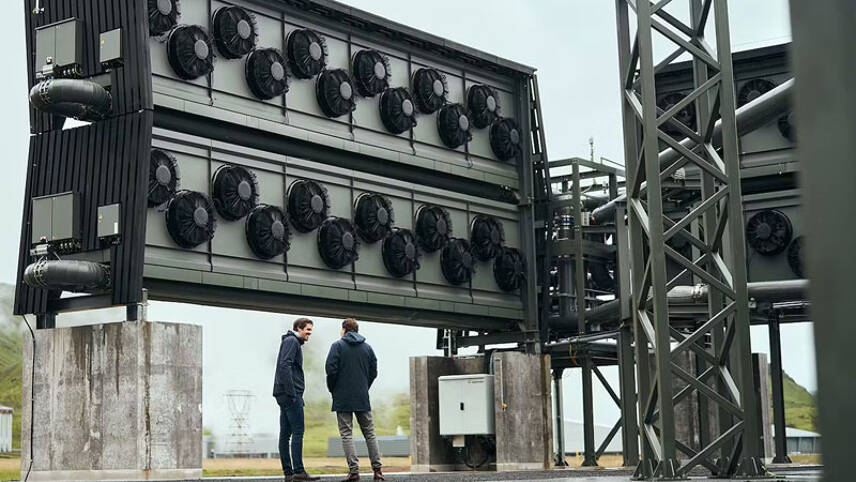Register for free and continue reading
Join our growing army of changemakers and get unlimited access to our premium content

Image: ClimeWorks. Pictured: Direct Air Capture in operation in Iceland
The proposed methodologies would apply to both national ‘compliance’ carbon markets, which nations operate as part of their Paris Agreement commitments, and voluntary carbon markets, which enable actors in the private sector to purchase offsets.
They have been developed by the CCS+ Initiative, which convenes 51 organisations with expertise in cleantech, green policy and emissions accounting. Consultations have already been run with these organisations, and the Initiative is now seeking wider feedback and input.
Technologies covered by the methodologies are direct air capture; carbon storage in saline aquifers and technologies enabling the transportation of captured CO2.
Further methodologies covering bioenergy with carbon capture and storage (BECCS), geological carbon storage in depleted oil and gas fields, and CCS co-located with industrial processes, will be released later this year.
“The integrated carbon accounting infrastructure will provide the quality assurance to ensure that projects lead to real, quantifiable emission reductions or carbon removals,” said Verra in a statement
Verra has been slammed this year with accusations that its existing approaches are not delivering the slated carbon benefits. An investigation led by the Guardian concluded that 90% of Verra’s rainforest credits are “worthless”. Verra staunchly contested the investigators’ methods but nonetheless agreed to reform and replace its rainforest credit scheme by mid-2025.
Verra has issued more than one billion carbon credits since it launched in 2009. The vast majority of these credits have concerned emissions reductions or removals from nature-based projects. Going forward, Verra’s chief programme development and innovation officer Toby Janson-Smith said, investment in man-made solutions will also be needed.
Janson-Smith said: “Carbon removal methodologies are an important complement to methodologies that avoid emissions, and need to scale significantly in the next 20 years to meet climate targets. Verra looks forward to a thorough, transparent consultative process that can result in the best possible methodologies.”
Verra’s consultation is open until Saturday 29 July.
CCS debate
While bodies including the IPCC and the UK Government’s own scientific advisors – the Climate Change Committee (CCC) – have stated that man-made carbon capture will be an “option, not a necessity” in transitioning to net-zero.
Globally, the collective capacity of all operational CCS and CCU plants is estimated to be 38.5 million metric tonnes. These arrays are addressing less than one-thousandth of global emissions annually, which now exceed 50 billion tonnes. The IPCC’s 1.5C-aligned scenarios have the global CCS capacity averaging 360 billion tonnes by the end of the century.
While scaling CCS is clearly important, there are concerns that some are betting on these largely new technologies rather than working to reduce emissions and back nature-based carbon storage.
Related news: New joint commitment launched to boost carbon market integrity
Apply now for the edie Net-Zero Awards
Readers interested in the above article may be keen to enter edie’s new Net-Zero Awards.
From breakthrough innovations and solutions through to industry-leading carbon reduction programmes and bold collaborative initiatives – this is THE awards scheme have your net-zero efforts and achievements recognised by thousands of businesses and climate experts.
The Net-Zero Awards have been launched as a sister scheme to the long-running edie Awards in response to the surge of innovation and corporate action to accelerate the net-zero transition. The Awards are open to all organisations across the public and private sectors and of all sizes from the largest multi-nationals to the smallest micro-businesses. Winning an inaugural Net-Zero Award empowers teams, inspires stakeholders and ultimately accelerates the corporate net-zero transition.
Applications are open until 14 July and awards will be presented on 15 November.
Click here for full information and to apply.


Please login or Register to leave a comment.